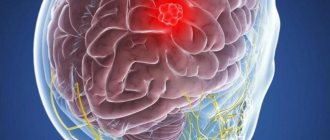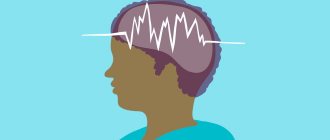Drug addiction is a complex disease that affects all areas of a person’s life: it destroys his body and personality. Therefore, detoxification is not enough to treat drug addiction. Removing the withdrawal syndrome will put the disease into a state of remission, which will certainly be followed by a breakdown if the necessary measures of psychological assistance and post-inpatient rehabilitation are not taken.
In a hospital setting, the patient will receive round-the-clock assistance from specialists, constantly work on himself and restore his personality. But even after leaving the hospital, treatment will not end; the former drug addict will have to undergo long-term rehabilitation and resocialization. What is it and what happens to a former drug addict after completing treatment at the clinic?
What is a breakdown
Strong psychological cravings persist even after complete withdrawal from psychostimulants. It is enough to use drugs once after a course of treatment, and over time everything will come back. This is why it is so important, especially in the first year after rehabilitation, to support the person and pay attention to the slightest changes in behavior.
Let's consider several reasons for the failure:
- Unfinished treatment or failure to follow the recommendations of a narcologist after a course of therapy.
- Disagreements and misunderstandings appeared in the relationship. Due to an unstable emotional state, a person feels the need to relax, but he does not know any other way but to use again. Conflicts and misunderstandings in the family cause breakdowns.
- Old acquaintances reappeared in the surroundings. A person decides to try alcohol or smoke weed for company. And he doesn’t even realize that because of this, the craving mechanism is triggered and the disease develops again.
- Alcoholic drinks are replacing drugs. In a state of intoxication, a person decides to take another dose of psychostimulants.
- Problems at work. A person is accustomed to an easy lifestyle; difficulties at work easily unsettle him. There is a desire to relieve stress.
After returning to stimulants, a person falls into a trap. He cannot get rid of his addiction on his own, and at the same time it gets worse every day. Therefore, it is better to prevent a breakdown than to undergo a long course of rehabilitation again.
Withdrawal syndrome in drug addicts
Withdrawal syndrome in drug addicts is also called drug withdrawal. When a person has developed a stable physical dependence on drugs, he can no longer easily stop using them. The body will experience painful physical and mental conditions, withdrawal, until it is completely cleansed of narcotic toxins. This is why faster detoxification brings less suffering, relieving withdrawal symptoms faster.
Drug withdrawal varies in duration, intensity and nature of symptoms depending on the type of drug addiction. Withdrawal from various drugs also begins at different times, usually after several hours or days. The painful state of withdrawal syndrome is unbearable for a drug addict, so without treatment, breakdowns occur. This is precisely why withdrawal syndrome is dangerous, leading the patient further and further along the path of the disease.
Symptoms of an approaching breakdown
Mental and physical exhaustion is a dangerous symptom. A person tries to compensate for his condition with achievements. He begins to work more, spend money thoughtlessly, and build relationships with the opposite sex. This helps to somehow increase the number of neurotransmitters responsible for pleasure and joy. Despite all the achievements, due to the depressed state, a return to psychostimulants occurs. Therefore, if a person close to you is overly active and is very excited and agitated, you need to be careful.
The other scenario is completely opposite. After long-term rehabilitation, a person returns to the real world and cannot adapt, despite the socio-psychological adaptation carried out. It is difficult for him to contact people, work in a team, and build relationships. Every day, from morning to night, he wants to drown out his internal pain with psychostimulants. Therefore, depression and increased aggression are alarming symptoms.
The environment changes 100%. A person does not communicate with alcoholics and drug addicts who used to be “close friends” for him. After therapy, relatives are wary of the family member, continuing to remember the unpleasant actions that he committed while intoxicated. Accordingly, he has no one to talk to - he has no friends, and his relatives cause distrust. It is much easier to establish old contacts, which will provoke repeated use. Remember that any reproach towards a person can push him to breakdown and destruction of his own life.
Detoxification
This stage of treatment for cocaine takes place in a drug treatment clinic. Here the patient is given infusion therapy and droppers are placed. Sometimes hardware blood purification is used. To restore health, general strengthening therapy and therapy are carried out aimed at restoring individual systems and organs: liver, brain, cardiovascular system. This treatment is of great importance in restoring the health of the drug addict. It also frees him from cocaine withdrawal, physical dependence on cocaine.
What should loved ones do if a breakdown is approaching?
An important rule is never to reproach a person or create scandals. The man has gone through a difficult and long path of rehabilitation and now he needs the support of loved ones. If you regularly remind about your past life, get offended, reproach and make trouble out of the blue, this will inevitably lead to stress and breakdown.
There is no need to show excessive attention, as well as control every step. This will lead to misunderstanding and irritation. Therefore, adhere to the following rules:
- Avoid harsh criticism.
- Be interested in the person's life, but don't be intrusive.
- Try to prevent communication with people from the previous environment with whom the person took drugs or drank alcohol.
- Don't let the person be completely alone.
- Instill a love for a healthy lifestyle, including by example.
- Be sure to find an interesting hobby so that the person has an exciting activity.
- For stress and nervous tension, consult a psychotherapist.
- Avoid conflicts in the family, maintain a pleasant atmosphere.
Serious concern should be shown in case of depression, the appearance of strange friends, or changes in behavior. If you cannot cope on your own, then it is better to seek help from professionals. At the center for professional treatment and rehabilitation “Zdravnitsa” there are post-rehabilitation support programs, and specialists are ready to answer your questions at any time and help you find a way out of the current situation and avoid a breakdown.
#1 Addiction Expert on the Mistake All Parents Make
The topic of drug addiction is one of the most discussed in the country Photo: depositphotos.com
The head of the St. Petersburg organization “Humanitarian Action” Sergei Dugin, a man who is considered the No. 1 expert in Russia on working with drug addicts, visited Yekaterinburg. He came to participate in the talk show “By-by-stigma” in Yekaterinburg, dedicated to drug addiction. It's a disease? How to defeat her? Do drug addicts have the right to their lifestyle? Should we give them methadone and keep them in prison? And, most importantly, what to do to prevent a child from becoming a drug addict - in an interview for URA.RU.
— You became a peer consultant (a specialist who accompanies a drug addict during rehabilitation) back in the terry 90s. Is a peer consultant always a former drug addict?
- Not necessary. This could be a person who has simply been in this topic for a long time.
— The current head of the famous City Without Drugs foundation, Dyusha Kabanov, said that he was addicted to heroin, consuming large doses, calculated in grams. Are you one of the former? Did you use drugs?
Dugin is called the No. 1 expert in Russia on working with drug addicts
Photo: Anna Mayorova © URA.RU
- No. I used to smoke weed, it was a long time ago. In 1995, my wife died after consuming poppy straw, and I began working in a rehabilitation center at the temple. Then he plunged into the topic of combating HIV infection, then became a social worker in the Doctors of the World organization. And then we opened the Humanitarian Action project.
- What do you do?
— We work with those who use drugs, who engage in sex work with HIV-positive people, and recently launched a project to help people with limited mobility with HIV - it is led by Masha Lapina (she came with me to Yekaterinburg). Roughly speaking, this is palliative care for HIV-positive people at home. And we started with sex workers: in St. Petersburg, in some places, they then stood at each pole with five or six people. We drove up to each pillar, and during a shift, 6-7 hours, we had 25 people pass by every day. And absolutely all of them were on heroin.
— Drug addiction has become one of the most discussed topics in society today. Recently, a wave of discussions arose after the deputy head of the Federal Penitentiary Service spoke in a positive manner about methadone. This was surprising: in Russia there is no replacement therapy and, apparently, there will not be one yet - unlike Western countries. Is it true that in England they already give pure heroin instead of methadone?
— I don’t know about the UK, but in Denmark, yes.
— Yekaterinburg narcologists have always said: methadone is bad, it turns a drug addict into a “vegetable”, it’s a “corruptive influence of the West”, it doesn’t suit us. Why did the security officer suddenly say about methadone? Is this a misfire of the system or is something healthy starting to break through?
The project to help people with limited mobility with HIV is led by Maria Lapina
Photo: Anna Mayorova © URA.RU
“We won’t know the truth, but one of the versions that people from the correctional system voiced to me is this: the oversaturation of institutions with drug addicts is already such that something needs to be done about it.
— I heard the figure that up to 80% of those in prison are drug addicts. It’s not for nothing that Article 228 of the Criminal Code is called the people’s article.
— I think that this is close to the truth: there are really a lot of people imprisoned under this article.
— “Repressive drug policy” is criticized for good reason?
— If you look at how many of the total number of people who were imprisoned for drugs were convicted of large-scale sales, then I think it will be one percent. But for the most part there are people there who need to be treated, not punished.
— Is there another option other than putting drug addicts in prison?
Article on the topic
Anyone can become a drug addict
- Yes: offer them an alternative to punishment - treatment. This practice is emerging here in St. Petersburg; we are trying to do something similar to the “drug courts” in the USA. A specialist in accompanying drug addicts goes to the court website, finds all the trials under Article 228, arrives and sees in the corridor the person who will now be tried. And he starts a conversation with him: “I work in such and such an organization, if you need help, I’m ready to help you.” He talks about rehabilitation and suggests what you need to tell the judge - about your readiness to undergo treatment.
- Just like in Western films!
— Then everything depends on the judge. Some, without even looking, issue a fine of five thousand rubles. And when the consultant then approaches this person, he already has the attitude: “Why do I need this!” And those to whom the judge assigns an alternative punishment are willing to make contact. We already have several cases, five or six, where it worked. One very striking example is when the judge ordered rehabilitation for a girl; with our help, she collected all the documents, went through detoxification, rehabilitation, got a job and is now raising a child. And she was not deprived of parental rights.
— How to convey to the state that such a measure can be effective?
“There is a compelling argument: treating drug addicts is economically beneficial. We once calculated how much people spend on drugs per year. In 2011, we had a very “intense” study: we went to specific dens, from where drug addicts send a messenger once a week to steal, buy and bring it for everyone.
According to our calculations, it turned out that about 19 billion rubles were spent annually in St. Petersburg on opium drugs (heroin, methadone) alone. Now there are probably about 10 billion: the number of heroin addicts has decreased.
Photo: Anna Mayorova © URA.RU
And then they compared how much is allocated for working with addicts: for rehabilitation, prevention. The numbers are so small that it’s funny to even talk about it. But there are costs for treating drug addicts for other diseases - HIV, tuberculosis. The chief phthisiatrist of St. Petersburg once said at a meeting that St. Petersburg is the capital of multidrug-resistant tuberculosis (when treatment was interrupted, the disease developed protection from drugs and it is necessary to use second- and third-line drugs - editor's note). The cost of treating multidrug-resistant tuberculosis for one patient is - from 10 thousand dollars. Not to mention the loss of life.
Every year in St. Petersburg there are about two thousand overdoses a year (when people are taken to the hospital). 700-800 people die.
— Another surge in discussions about drug addiction in the public was caused by a recent story with a publication on the portal “Batenka”, which published an interview with drug addict girl Theo, who said that she likes to live like this. The magazine removed this publication, citing instructions from Roskomnadzor. The situation clearly shows the clash of two paradigms. The first, traditional one, is that a drug addict is a criminal: the image of a drug addict shooting up in a dirty entrance will live on for a long time. The second, from the “decaying West” - that drug addicts are people too, they have the right to exist and, perhaps, even have the right to live the way they want. Or not? What point of view do you adhere to?
— My opinion: a drug addict is a sick person. I sometimes give an example with a bad tooth: a sane person tries to the last to save the tooth and cure it. And only when there is nothing left to save, when the tooth only causes harm to the body, it is removed. Each person is a tooth, and the state is an organism. And a sensible state is trying to save each of its people. Does a person who is sick have the right to life?
The new leader of the Drug Free City Foundation is going to meet Putin
- Certainly! But more often he is seen as a criminal!
- This illness forces him to commit crimes. But if a person brings pain and misfortune to others, “sows horror,” then he is isolated - both in the West, and in America, and anywhere.
— That is, you don’t share the position of drug addiction lawyers who say that these people have the right to live like this?
“Recently, two young girls, about 19 years old, came to our organization. They said that there is nothing wrong with using drugs: they say, we feel great and live normally. They dress well and speak well. But the one who uses more already has the face of a drug addict - a person who has been using drugs seriously for a long time. They described everything so colorfully that all of our people who were in the office gathered.
People who used to use say: “Are you even out of your mind? We lived in such a life, some for 10, some for 20 years, we barely got out of this shit, and now God forbid we go back! So you haven’t understood anything yet.”
- Okay, drug addiction is a disease, drug addicts need to be treated, but there are also a lot of questions here. The most pressing is about rehabilitation centers, which are, in fact, private prisons. In the Urals, many rehab centers were created in the image and likeness of Roizman’s “Drug-Free City.” They say a lot about them - that torture and physical punishment are used there, that people who should not be there are locked there by order of relatives. At each such center there are, as a rule, so-called force capture groups that pick up the drug addict son (or daughter) and take him to the center.
— Personally, I would imprison the organizers of such rehabilitation centers.
- But these are your colleagues who are engaged in rehabilitation!
- This cannot be called rehabilitation. I heard from the outside how the people who run such centers talk. They themselves used drugs before, and now they work in these centers. Such a person, apparently, is not able to realize himself in life in any other way, and this activity gives him power over people. He himself is sick and needs to be treated.
“This is not a drug center, but a private prison.” Special report
There is no question of any professionalism, this is criminal activity. Previously, I opposed licensing or certification of rehabilitation centers - now I think it is necessary.
— Do you think that recovery from drug addiction is possible only on the principle of voluntariness?
— There is an opinion that when a person goes to prison, it helps. For some - yes, but for others (this is in most cases) no. Everything depends on the person: on his personality, motivation, even on genetics. If in the family grandparents drank, dad and mom drank and hung out, then the child will be the same and you can’t do anything about it. While he is isolated (in prison, in a rehab center), he will not use, but as soon as he gets out, he’s off and running. Among all drug addicts there are 30-35%.
About 20 percent are those who got into drugs out of curiosity or to avoid being black sheep in the company. They hit easily and quit easily; for them, any ordinary rehabilitation course gives a positive result. And for the most part, they don’t return to drugs, because it’s not theirs.
But for those who started hanging around, trying to get away from problems, this is the most difficult thing. Few people know how to work with this.
Why do people even start taking drugs?
— The most correct explanation is provided by the biopsychosocial-spiritual model of the disease. In “bio” we are talking about endogenous opiates - the so-called “hormones of happiness”, which provide the necessary level of serotonin. In a person whose level is usually normal, it rises after consumption. Then it dropped to normal, rose again, etc. And then at some point it drops below normal, the person no longer feels comfortable. It turns out that he has overestimated his standard and can no longer live without a buzz.
You need to look at the root of things
Photo: Anna Mayorova © URA.RU
And people with a reduced level must somehow get the norm! And, as soon as a person reaches the age when he can try alcohol or drugs, he tries them, and “bang” is the norm! “So this is what I need to feel comfortable like other people,” he thinks. But, since his norm was reduced, he begins to use constantly. And he will never have an “average” norm. Whatever you do with such a person, he will never quit.
An equally important psychosocial component is the family. A shelf is broken, and a message goes from mom to dad: “Vasya, nail the shelf!” And dad came home from work tired, lay down on the sofa, turned on the football. The next day again: “Nail the shelf!” All this develops into a conflict: “Should I find another man?” The child looks at this. At some point, there is a message to him: “Bring the diary!”: dad wants to find a deuce there in order to convict mom that she is not taking care of the child. And the child gets a belt without understanding why. All this continues: the shelf will require repairs, the child will receive a belt.
At some point, he walks down the street and sees people standing there whom he knew before, but did not hang out with them because they are “bad” - they drink, they are hooligans. They told him:
“Why are you so sad? - Yes, at my house... - Brother, we all have the same problem. You’re wearing a beer...” (or a joint, or a snort, or a pill). He used it, came home, and doesn’t care what happens at home.
The next day he feels bad, and he himself runs there: “Guys, let me smell it” (or a pill, or an injection). Then he starts buying and is drawn into the system. A few months later, the parents discover: “Vasya, his veins are punctured!” They start dragging the child around some centers. And then there are those who say: “Do you want us to save you from this?” The guy is taken to a rehabilitation center, but no one understands what happened in the family, which is why he started using. If a person went through rehabilitation and did not understand what was happening to him, why he got into that company and started using drugs, then he will relapse. And if he has figured it out, then when something happens in his life, some kind of stress, he no longer sits on this hook.
The “Drug-Free City” commented on the kidnapping of people by employees of a center for drug addicts
- But his parents haven’t changed?
— You definitely need to work with them, with codependents. Often a person seems to have undergone rehabilitation and is, in principle, ready for a different life, but he comes home, and his parents have not changed at all. In the evening they check him: are his eyes normal or “let’s pee” (for a quick test). Parents don’t understand how to behave: love remains, but there is no trust if he stuck around and deceived them for 10 years. After good rehabilitation, a person understands that he needs to regain this trust. But parents who attend groups also learn how to behave in order to restore an atmosphere of trust. How to recreate the world of family. Only then is there a chance that everything will be fine.
— How to prevent a child from starting to use drugs?
- No matter how funny it is, these are absolutely banal things. If parents punish a child, he must always understand why, what he did wrong, the punishment must be justified. In general, you need to love the child and create an atmosphere of absolute trust in the family, so that he can at any time approach his father or his mother and talk about anything. Parents should be friends with their child; they must spend time with him, no matter how difficult it may be to carve out time for him.
— What should parents do if they don’t have enough time for their family?
Drug addiction experts: if there is trust in the family, the risk that the child will start using drugs is minimal
Photo: Anna Mayorova © URA.RU
— Another option is to involve children in what you do. My youngest, for example, is now filling out a database of volunteers; he has participated in our events more than once. When there is a family atmosphere in the family, the risk that the child will start using drugs is minimized. And if parents are busy all the time, they “can’t do it” all the time, the child will begin to look for what he needs somewhere else.
— Should schools be involved in drug addiction prevention?
— The situation in education today is monstrous, below par! And demand that schools also fight drugs! They don't understand what's going on at all. Just like their parents: their ideas about drugs are like in the movies. The problem is that we do not have a good, adequate federal drug addiction prevention program that would be sent to the regions and implemented in all schools. Whoever comes up with something does it. Let’s say they’ll come up with an anti-drug race. I always laugh: “Is it that there are 10 drug addicts at the start, and 10 healthy ones at the finish?” This is the formation of a healthy lifestyle, but not the prevention of drug addiction.
What to do if a breakdown has already occurred?
Do not ignore a single drug use, because after this the person ends up in a vicious circle and cannot get rid of drug addiction. A consultation with a psychotherapist is required to find out the cause of the breakdown and adjust the further treatment program.
If a breakdown has already occurred, you need to seek help from specialists as quickly as possible. A single dose of a psychostimulant will not be fatal, but the fact of what happened cannot be ignored. Professional consultation and correction of the recovery plan will help not only to identify the causes of the breakdown, but also stabilize the patient’s condition itself.
It is important that relatives do not once again save the drug addict, but support and help him continue his recovery.
A breakdown is a signal that the reasons behind the development of addiction have not been fully worked out. But even in this case, do not despair. Treatment for drug addiction is a long and difficult process that lasts a lifetime.
The Center for Professional Treatment and Rehabilitation "Zdravnitsa" offers individual drug addiction rehabilitation programs, and also provides comprehensive support after completion of treatment. We organize visits to cultural and youth institutions, leisure activities, help with education and employment.
If you notice alarming signs in the behavior of a loved one after a rehabilitation course, call the hotline: 8 (800) 200-27-23. Anonymously. Around the clock.










